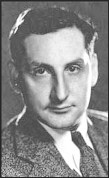Skip to: site menu | section menu | main content
Welcome To Democracy And Socialism .Com
Things should be made as simple as possible, but not any simpler- Albert Einstein
John Howard Lawson (1894 – 1977) |
 |
John Howard Lawson was the most brilliant and intellectual screenwriter and playwright of 20th century in the United States. He was also an ardent social and political activist who fought for the freedom of expression, peace and social justice in the world.
When the 1st World War broke out between the imperialist powers, and its extent of the carnage and human suffering became evident, Lawson left the comfortable scenes of theatre without hesitating and headed to the bloody scenes of war to help the people.
He became a volunteer ambulance driver with the Red Cross in France. There he worked and became friends with Ernest Hemingway, Edward E. Cummings, and John Dos Passos.
After the War he began editing a newspaper in Rome and working as a publicity director for the American Red Cross. Then, he continued his writings which often expressed his socialistic ideas. Some of his playwrights found their way to Broadway and became popular.
In 1928, he left his birth-place, New York, and came to Hollywood, where he wrote scripts for the films that were successful.
In 1933, he with Samuel Ornitz and Lester Cole established the Screenwriters Guild and was the organizations first president.
In 1934, he joined the American Communist Party to organize his struggle for a just and peaceful society for all.
Following the 2nd World War and with the rise of socialistic ideas in the U. S., the unmasked frightened bourgeoisie took offensive stands and began to prosecute anyone with progressive ideas. Thereby the House of Un-American Activities Committee was created and began investigation in the Hollywood Motion Picture Industry. In September 1947, the HUAC interviewed 41 people who were working in Hollywood. These people attended “voluntarily” and became known as the “friendly witnesses”, but ten of them refused to answer any questions. They said that the 1st Amendment of the United States Constitution gave them the right to this. For them it was the time to defend the most basic right of humanbeings, the freedom of expression. The HUAC and the court during appeals disagreed and all were found guilty of contempt of Congress. Lawson was one of those ten who was sentenced to twelve months in Ashland prison, fined and blacklisted.
He moved to Mexico where he began writing Marxist interpretations of drama and film making.
Later he returned back to the U.S. and went to lecture tours in American universities, where he talked about the importance of theatre and cinema in teaching and informing the people. Lawson died in San Francisco on the 14th of August, 1977.
His most important works are:
-
Servant-Master–Lover (1916).
-
Standard (1916).
-
Roger Bloomer (1923).
-
Processional (1925).
-
Nirvana (1926).
-
Loud Speaker (1927).
-
The International (1927).
-
Dream of Love (1928).
-
Dynamite (1930).
-
The Sea Bat (1930).
-
The Ship from Shanghai (1930).
-
Our Blushing Brides (1930).
-
Bachelor Apartment (1931).
-
Goodbye Love (1933).
-
Success at Any Price (1934).
-
Treasure Island (1934).
-
Gentle Woman (1934).
-
The Pure in Heart (1934).
-
Party Wire (1935).
-
Marching Song (1937).
-
Algiers (1938).
-
Blockade (1938).
-
They Shall Have Music (1939).
-
Four Sons (1940).
-
Earthbound (1940).
-
Action in the North Atlantic (1943).
-
Sahara (1943).
-
The Counter-Attack (1945, Academy Award winning film).
-
Smash-Up : The Story of a Woman (1947).
-
The Hollywood Ten (1950).
-
The Hidden Heritage (1950).
-
Cry the Beloved Country(1951).
-
Film in the Battle of Ideas (1953).
-
The Careless Years (1957).
-
Film: The Creative Process (1964).